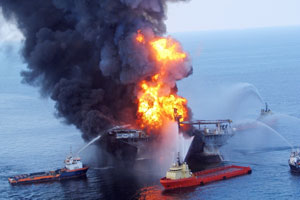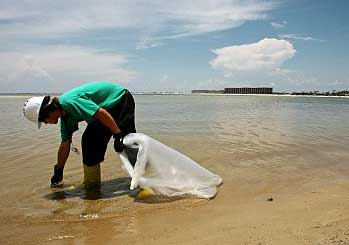PBS Need to Know‘s Jon Meacham recently interviewed Carl Safina, president and co-founder of the Blue Ocean Institute, on the dirty dispersants BP is using on the spill, the long-term forecast for the Gulf, and why the spill is shaping up to be the oil industry’s Chernobyl. The segment (below) is really worth watching in its entirety, but here are a few highlights:
Jon Meacham: You testified last week that the dispersant was an out-of-sight, out-of-mind strategy.
Carl Safina: A good way of thinking about it is you have a greasy pan, you put the detergent on it and it starts dissolving the oil. So it’s no longer sticking in a concentrated way, it’s creating a bowl of dirty dishwater. That’s what a dispersant does. It doesn’t neutralize the oil. It doesn’t make the oil go away. In fact, the dispersant makes the oil more toxic to living things…The toxic parts don’t evaporate, because they’re not at the surface. They can get into the gills, into the mouths of fish, and they bathe all the larval eggs, all the baby fish, and all the little baby crustaceans…And the dispersant itself is also toxic.
…
JM: What are your views on the long-term effects on ocean life?
CS: No one knows exactly what the long-term effects will be, but we have quite a bit to draw on. We know the oil is toxic, we know the dispersant is toxic, and it makes the oil more toxic, and we know there is more of it in this semi-enclosed body of water than has ever happened in history. So there is almost certainly a very large die-off of fish eggs, fish larvae, and plankton communities. We also know that turtles eat oil. They just tend to ingest these blobs, because they eat jellyfish usually. And it kills them. We also know it kills dolphins and whales. When the Exxon Valdez ran aground it killed about 40 percent of the killer whales there. That population has not recovered in 20 years. The herring population has also not recovered in 20 years. So we knows it kills wildlife at the moment of the event, and that the long-term effects can linger for decades.
JM: Characterize this. Is this a Katrina-like event? What are the analogies in history that you’re thinking of?
CS: In talking to people in the Gulf, they are saying this is going to make Katrina look like a bad day…I think that rather than this being something like Katrina, this is Big Oil’s Chernobyl. I think it’s a catastrophe that shows the enormous risk this industry poses to public health, and to the health of communities.
JM: Who do you blame for the spill? Is it BP? Is it lax regulation? And what can we do to make sure this doesn’t happen again?
CS: I think we have a culture of irresponsibility and a culture that makes us think about ourselves first, instead of our safety first, or our community first, or our country first. BP has been irresponsible. They had indications of trouble, they went ahead. They didn’t want to spend more money on a better backup system. They didn’t have backup plans. On the other hand, we have a government whose job is supposed to be to insulate our interest—the public interest and the interest of the future and the country—from the narrow interest of a few people, and that failed, too.
…
JM: Is there any good that can come from this?
CS: I’m not sure any good can come out of this, but there is a very important lesson t be learned. People have said that the Stone Age didn’t end because we ran out of rocks. We’re trying to wring the last drops out of oil that we’re depleting. Ever since I was in high school we have known that what we need is a diverse array of fuel sources that focuses mainly on clean, renewable sources of energey…We need to move that way by building a grid that can carry that energy around the country from wherever it’s abundant to wherever it’s needed.
…
JM: What can ordinary Americans who are concerned about this actually do to help reverse course?
CS: One of the things that we hear is that we are all responsible because we all use petroleum. That’s not really why we’re all responsible. We’re all responsible because we haven’t insisted on an energy policy that gets us beyond fossil fuels. Ever since we’ve lived in caves, every time we want energy we light something on fire. We’re still doing that. I think it’s time for us to get out of our caves and use the clean, eternal, renewable energy.
This PBS Need to Know interview with Carl Safina comes courtesy of the Climate Desk collaboration.












